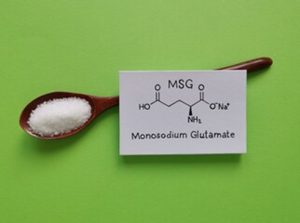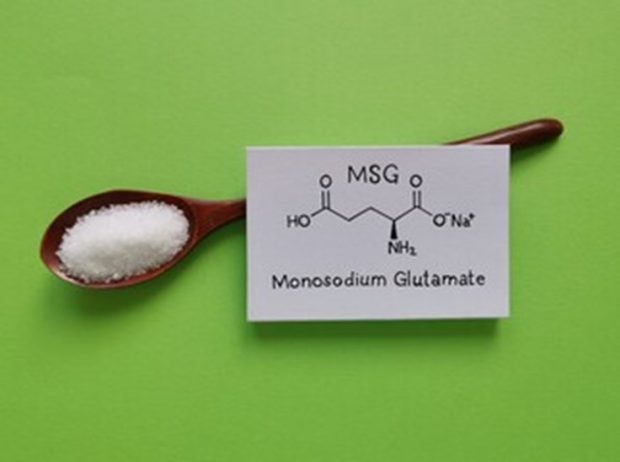Many North Americans believe that MSG causes headache, nausea, drowsiness, obesity and even heart disease.
In a recent poll MSG was found to rank highly among ingredients that American consumers avoid for health reasons.

Data from the International Food Information Council (2018). Figure adapted from (source).
So, what is MSG? and why are people afraid of it?

Crystalline MSG (source).
MSG is short for monosodium glutamate. It is one of the most widely used flavour enhancers. When added to food it provides a delicious umami flavour.
Glutamate is one of the most naturally abundant proteinogenic amino acids. It is naturally found in protein containing food. MSG is simply the sodium salt of glutamate.
MSG was isolated by Japanese biochemist Kikunae Ikeda from seaweed in 1908. Since then, it has been a flavouring additive is common in many foods.
Some are biased to assuming that MSG is only common in Asian cuisines. However, one should note MSG is far more versatile. Added to most bagged potato chips, fast foods, taco seasonings, and soups.
The negative view came from a 1968 study which dubbed MSG the cause of “Chinese restaurant Syndrome”. A condition said to cause headaches, sweat, and abdominal pain.
The name alone is targeting Chinese food without warrant to do so. The use of and naturally occurrence of MSG is far more widespread.
It has been understood more recently that this study and belief carry racist biases against Asian cuisine. As the poor choice of name may suggest this study was not carried out in a scientifically rigorous manner.
The study lacked proper controls, people in the study were aware of what sample they were ingesting and were asked to describe their symptoms.
Studies that have continued in this path of villainizing MSG suffer the similar issues. Poor sample size, doses significantly higher than regular consumption, and biased participants.
But, in blind studies the vast majority of people, even those who claim to be sensitive do not negatively react to MSG. Not one study has found a verified mechanism of MSG causing harm.
But, as mentioned in the poll a 4/10 Americans hold some of these beliefs and avoid MSG.
In spite of science, prejudice can be hard to overcome. If you catch someone saying they avoid MSG, I encourage you to see if they can explain why.


I found your blog to be quite interesting. It really opened my eyes that MSG isn’t only found in Asian food, but also processed food. I love MSG but my mother believes that MSG is bad, so that is why her food is always so bland. This is a great blog geared towards an audience that is skeptical of using MSG or to chefs and food scientists. I like the journalistic nature of this post. I can tell that it is journalistic because of the way you incorporated the part of “Chinese restaurant syndrome”.
I found this to be a fantastic blog. I’ve always thought MSG was bad for you. I guess thats just the american in me. WOW. I cant wait to startb using MSG in my cookingt. Thank you bridget for the insightful blog post !
I’ve heard about these negative rumours numerous times, but never looked into it myself. I thought the blog did an excellent job addressing the issues with past experimentation, and tailoring it to the general public who simply worry about the foods they are consuming. Opening with common concerns that people have and laying out the “bad science” step-by-step delivers the post in great journalistic style.
Hi Bridget, I find your article very interesting! I’m Vietnamese and I grow up having MSG in my diet. But only after 5 years living in Canada (detoxing from MSG-containing diet), eating Vietnamese food sometimes give me headache and nausea, which I’ve always assumed was the effect of MSG. Interestingly that studies haven’t shown that MSG causing these symptoms. Great post btw!